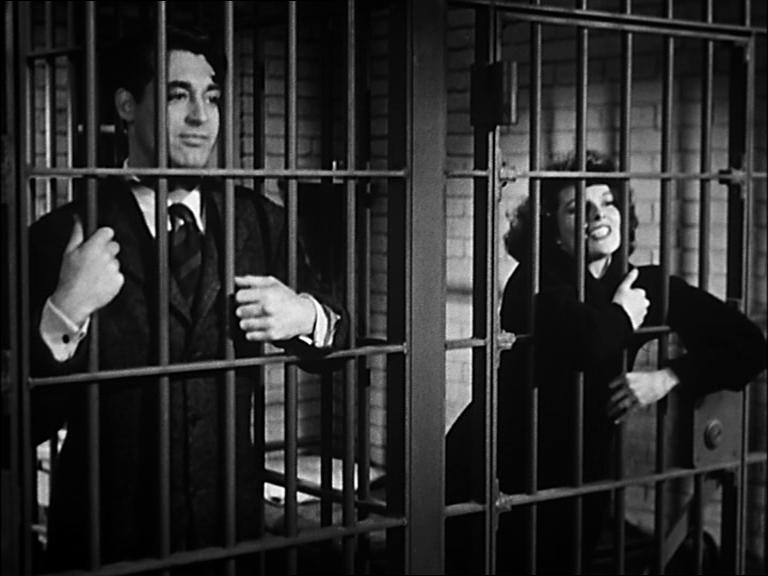In the romantic comedy Bringing Up Baby (1938) Hawks explores the association between animalism (behaviours or feelings associated with animals) and chaos. The comedy emerges out of the interactions between the unlikely pair: Susan (Catherine Hepburn) and David (Cary Grant). This is because Susan is an eccentric, chaotic and a law evading romantic and David is a bookish, restrained palaeontologist. Through a “series of misadventures” Susan becomes physically attracted to David. The comedy is ingrained in Susan’s misconstrued identity as a chaotic upper class citizen, as her lust for David is unrestrained. Susan generates chaos because she is distracted by her physical desire for David, meaning that she carelessly leaves David’s dinosaur bone-box open for George the dog to pilfer. The action revolves around finding the bone and Susan’s pet Leopard called Baby, that has been sent over from Brazil. She is unable to compose herself, meaning that the chase scenes are comedically prolonged. David, on the other hand, remains serious and restrained in these scenes. Unlike Susan, he restrains his desires in his every day life, marked by the lack of intimacy with his finance, Miss. Swallow. In the presence of Susan, his primal, animalistic side emerges because she is unrestrained meaning that her identity is affiliated with the animal world.

In the jail scene, the psychiatrist deems Susan and David mad due to the absurdity of the claim that they are searching for a Leopard. Significantly, David and Susan are framed in a medium shot behind bars. They are restrained in separate cells, creating a visual allusion to caged animals in a zoo. With this in mind, the separation of David and Susan suggests that they are separate species. This distinction reigns true throughout the film as Susan is more animalistic than David. As the action descends further into chaos, we see that people are not distinctly restrained or unrestrained. David is forced to restrain his animal side with Miss. Swallow, but with Susan he shows that he has physical needs and desires. The framing also suggests that civilised society should be restrained if outwardly convey animalistic desires, hence why David restrains himself. But by depicting them in this way, David and Susan’s desire for one another is restrained by social institution of law.
Susan escapes from the prison cell in order to prove that she owns a Leopard, contrary to the prison officers belief. It becomes a sequence of ridiculousness as the small, internal prison becomes occupied by a large volume of people who condemn the absurdity of Susan and David’s claims. Amidst the congregation, Susan mistakes Baby (the tamed Leopard) for the untamed circus Leopard, posing a threat to civilised society. Upon realising that she is mistaken Baby for the other Leopard, she and David frantically lock it in the cell. Miss Swallow and the Leopard are restrained in separate cells, allowing Susan and David to embark on an unrestrained life together in the absence of any threat. This means that they can fulfil each others innate needs and desires.